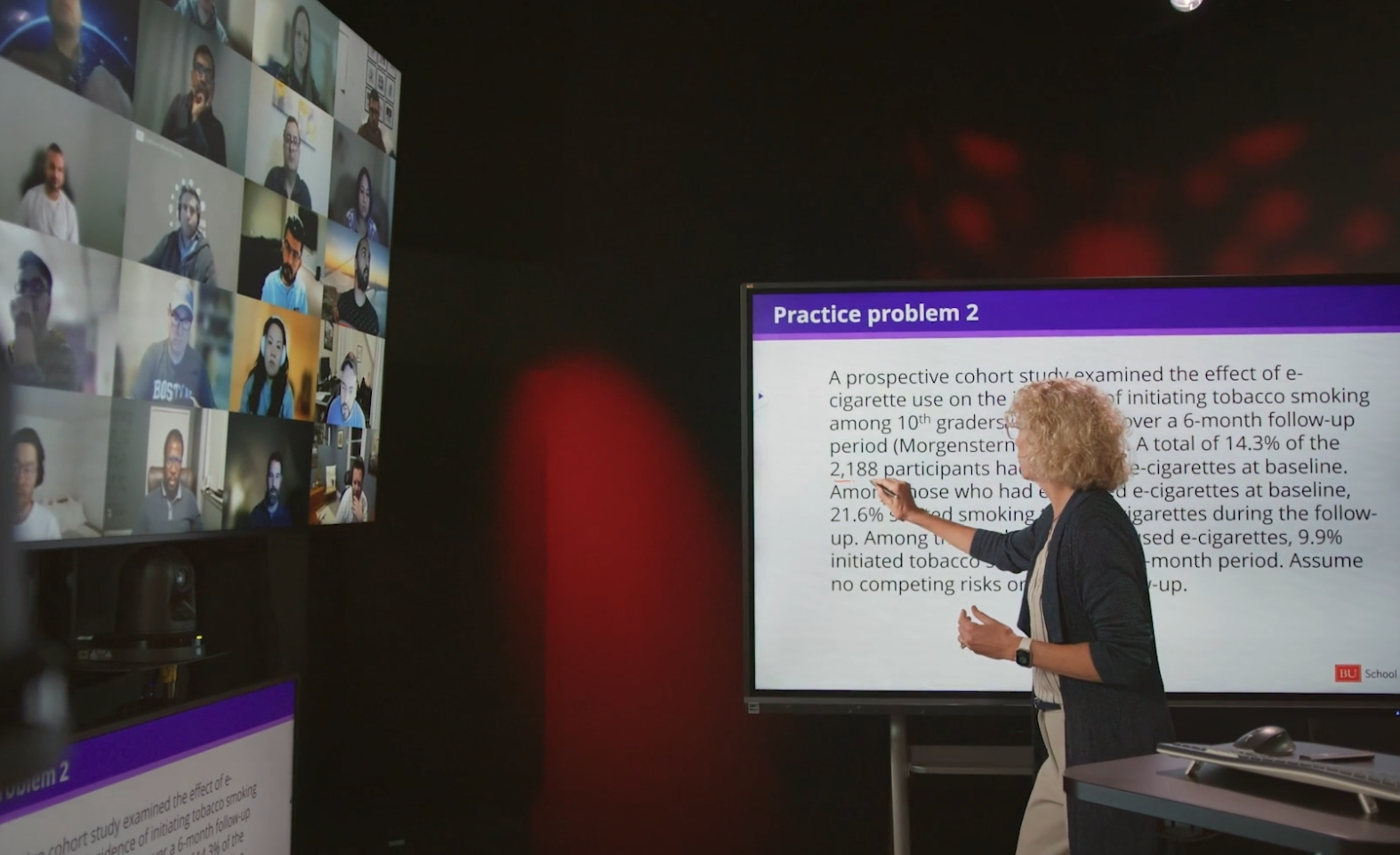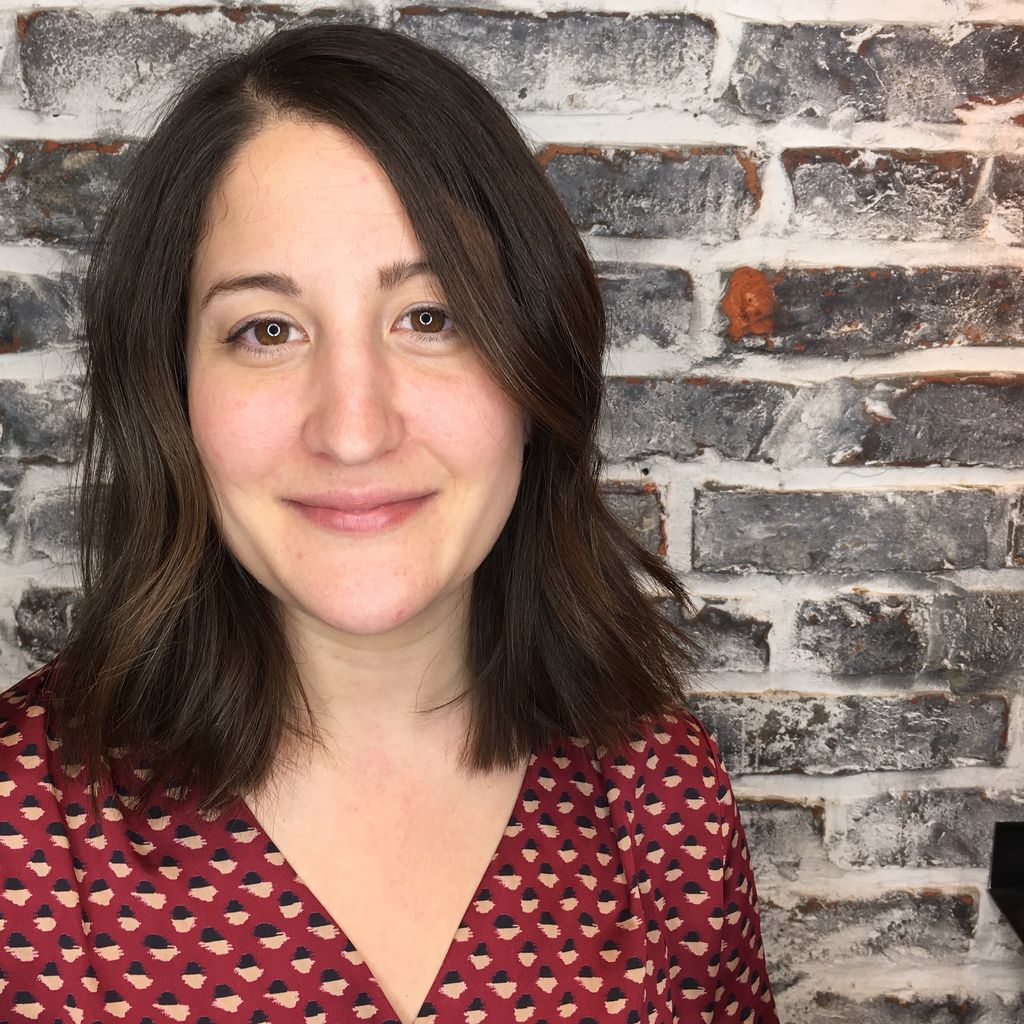Meet Emily Goldmann, Director of SPH’s Online MPH Program.

Lisa Sullivan, associate dean for education, presents during a live session for SPH’s Online MPH Program.
Meet Emily Goldmann, Director of SPH’s Online MPH Program
Goldmann, also a clinical associate professor of epidemiology, discusses what led her to SPH and why the innovative format of the Online MPH is changing the virtual learning experience for the public health workforce.
Emily Goldmann joined SPH over the summer as a clinical associate professor of epidemiology and director of the school’s Online MPH Program, after nearly a decade as a faculty member in the Department of Epidemiology at New York University School of Global Public Health. Now settled in her new role, Goldmann discusses what led her to SPH and why the innovative format of the Online MPH is changing the virtual learning experience for the public health workforce.
Q&A
with Emily Goldmann

What led you to teach public health?
I was not somebody who thought they would end up in the academic environment. I did my master’s and my doctorate in epidemiology, but my career goal at the time was to work at the New York City Department of Health and Mental Hygiene, which I did end up doing for about four years. Following that, I pivoted to consulting in health economics outcomes research. At the same time, I was invited to become an adjunct professor at City University of New York (CUNY), where I realized how much I loved to teach! I thought to myself, ‘why can’t I make this part of my day job instead of doing this at night, after work?’ I made the switch and joined the faculty at New York University School of Global Public Health full-time in 2014.
What drew you to SPH, and in particular the Online MPH Program?
I had previous experience teaching and developing courses online, so I am familiar with the digital public health space. What struck me about BU’s Online MPH first and foremost, is the price of $24,000 to complete the degree. Too often, public health education is expensive and out of reach. People aspire to join the public health field for the mission, and pursuing advanced education is a large commitment of time and resources. Higher education must be more accessible, which is a key goal of the Online MPH. The Online MPH was a big draw for me because I believe in its aspirations so sincerely.
What is the experience like teaching one of the Online MPH modules?
I am co-teaching the third module, Applied Populations Health Methods with Megan Healey, clinical associate professor of epidemiology and director of the On-Campus MPH program. We are currently discussing qualitative methods, focusing on environmental science and climate change. As the instructor, I lead the live sessions, which are optional since the entire program can be completed asynchronously as long as weekly deadlines and assignments are complete.
The live sessions are an absolute blast to teach! Our goal is to make them engaging and interactive, and allow students to engage with real-world examples. Oftentimes there’s a case study followed by robust interactive discussions. The live sessions are great opportunities to engage with BU faculty, and I have been so impressed by the experiences our students have from their own work in the field. We were recently discussing data collection and management systems, such as RedCap. Students shared their own experiences and examples of how they have used these systems, and the challenges they’ve faced. Even those who are new to the field of public health could contribute their own data analysis and collection experiences. The other students greatly benefit from this type of sharing and learning from each other.
What is one of the case studies the students recently discussed?
I introduced a study that I did during the early part of the COVID pandemic. We did a large survey of adult residents in five cities across the US South. We were interested in the impact of COVID-19-related stressors, including experience with discrimination, on mental health outcomes, particularly as so many people were experiencing layoffs and financial strain. The survey took place during the early pandemic period. First, I asked the students to review the abstract with me, and answer, ‘What was the question we were trying to answer? What was the outcome and the exposure? How was it measured?’
I did not give the students the limitations section, so I asked them to critique it based on how the study was conducted, and where there might be issues—not only from a bias perspective, but regarding concerns surrounding health equity. While my research collaborators and I were trying to identify differences by race and ethnicity, we were ultimately limited in our efforts to do so. For example, we had made strong efforts to recruit people from different racial and ethnic groups. We translated the survey into Vietnamese because Houston was one of our cities, and it has a large Vietnamese population. Unfortunately, we were limited by sample size to disaggregate the data further by race/ethnicity. Health equity questions like this should be a part of data collection efforts, and one of the students did identify this important limitation. The way we measure risk factors and health outcomes, the way we’re able to disaggregate groups of people who have very different experiences matters for our work in public health.
The Online MPH is part of Boston University’s online learning portfolio, BU Virtual, which is known for its “TV-studio-like” experience for live sessions. What is that like as a course instructor?
It is not your typical Zoom lecture or meeting, that’s for sure! When I joined BU, I wondered, “why a studio, why not just a standard Zoom session?” And I quickly realized that the studio creates this dynamic, energizing environment for the instructors and students. It is like being on a stage, where all the students have clear visuals and audio of you, the instructor. The use of technology and multiple cameras enables me to switch seamlessly between concepts, while having a full screen view of all students and the live class chat. There is also fun intro music. It’s a fabulous way to break the ice before we dive into the material.
What are your hopes for the future of the Online MPH?
One goal is to expand the program to additional regions of the world where an MPH degree may be out of reach. The program’s accessible cost and focus of health equity is so important for students across their career lifecycle. Second, is to continue to innovate on engagement opportunities in the virtual environment. How can we create even more network opportunities for folks spread out across the globe? Lastly, public health is changing so rapidly, I want to make sure that we’re always iterating, staying current in our examples, with an underlying focus on health equity considerations.
What intro music have you picked for your live sessions?
I’ve recently picked songs by Panic! At the Disco and Portugal. The Man. I’m jealous of my co-instructor’s great idea to pick all songs connected to Boston in some way. I wish I had thought of that!
Learn more about BU’s Online MPH
I acknowledge that by clicking the Submit button above, I am giving consent for representatives of Boston University to contact me about educational opportunities via email, text, or phone, including my mobile phone at the phone number above. I understand that these calls may be placed using an automatic dialer or prerecorded messages and I am not required to provide this consent in order to enroll. Message and data rates may apply. I may withdraw my consent at any time.